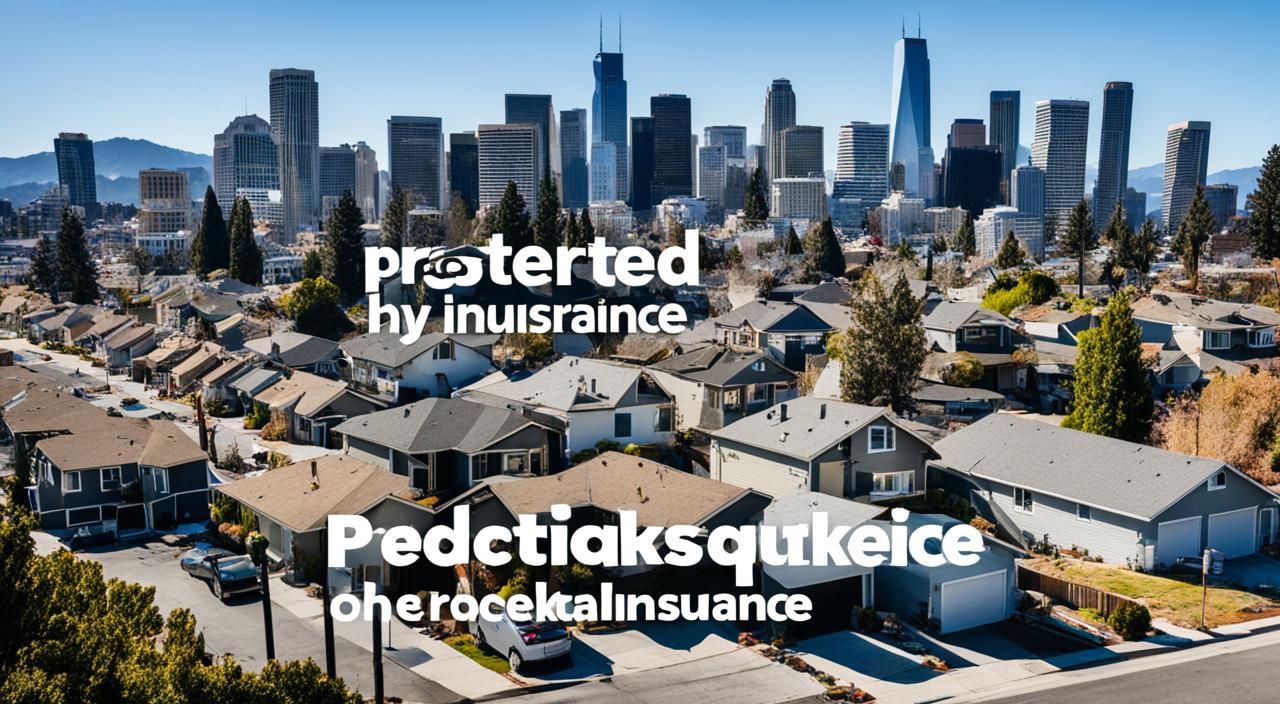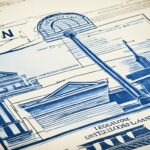Earthquakes are not just rare occurrences. They can cause major damage to your home. In the worst cases, they might even destroy whole buildings. Most people don’t buy earthquake insurance because it’s expensive. But, this kind of coverage is crucial. It helps pay for the damage that earthquakes can do. Without this insurance, fixing your home after an earthquake is on you.
Key Takeaways
- Earthquake insurance provides financial protection against the costly damages caused by earthquakes, which can include the complete destruction of a home.
- Earthquake coverage is typically an optional add-on to standard homeowners or renters insurance policies, rather than being included as standard.
- Homeowners living in earthquake-prone regions should carefully consider purchasing earthquake insurance to safeguard their property and financial wellbeing.
- Earthquake insurance policies cover damage to the home’s structure (dwelling coverage), personal belongings (personal property coverage), and additional living expenses if the home becomes uninhabitable.
- The cost of earthquake insurance can vary significantly based on factors like the home’s location, age, and construction materials, so it’s important to shop around for the best rates and coverage options.
Introduction to Earthquake Insurance
Earthquake insurance is a choice to keep your home safe from earthquake damage. It’s different from regular homeowners or renters insurance. You have to buy it separately. This way, you’re protected if an earthquake strikes.
What is Earthquake Insurance?
This insurance covers the costs to fix or rebuild your home. It also pays for your things that were damaged or lost in an earthquake. Without it, you’d have to pay for all repairs on your own if an earthquake hit.
Regions with Higher Risk of Earthquakes
How much you need earthquake insurance changes based on where you live. People in some parts of the West, South, Northeast, and the Midwest get it more. In these areas, 28%, 25%, 21%, and 16% have it. In California, most people get it because the earthquakes there can be really big and dangerous.
Coverage Provided by Earthquake Insurance

Earthquake insurance helps keep your home and belongings safe from quake damage. It offers many important coverages, which are vital if an earthquake hits.
Dwelling Coverage
This part of the insurance pays to repair or rebuild your home if it’s damaged by an earthquake. It means you won’t have to worry about the cost of fixing your biggest asset.
Personal Property Coverage
Your belongings, like furniture and electronics, are protected too. If an earthquake damages these items, the insurance will help you replace them. This lessens the financial hit on you.
Additional Living Expenses
If your home becomes unlivable, this insurance can pay for living elsewhere. It helps with the cost of a place to stay, food, and more. This support is crucial during the difficult time of getting back on your feet.
Building Code Upgrade Coverage
After a quake, building codes might have changed. The insurance can help with the extra costs to meet these new codes. This ensures your rebuilt home is up-to-date and safer.
This insurance overview is crucial for those living in quake-prone areas. It shows how to protect your home and finances after a major earthquake.
Exclusions in Earthquake Insurance Policies
Earthquake insurance is vital for homeowners, but it has specific exclusions. These policies usually do not cover certain types of damage from or after an earthquake.
Fire Damage
Fire damage from an earthquake’s direct cause is often not covered. Homeowners might have to use their regular insurance for these losses. Earthquake policies don’t usually help with this.
Land and Soil Movement
Damage from landslides, sinkholes, or ground shifting not tied to the earthquake is typically excluded. Such events happening without a direct link to the earthquake are usually not covered.
Water Damage
Water damage, like floods or burst pipes, is not covered by earthquake insurance. Homeowners should get extra coverage, like flood insurance, to protect against water losses.
Neglect and Wear and Tear
Damages from neglect, not keeping up the house, or normal wear and tear are usually not paid for. Homeowners are responsible for keeping their home up to date.
It’s key for homeowners to really understand what earthquake insurance covers. Knowing the limits can make sure their home and belongings are well protected if a big quake hits.
Earthquake Insurance
Earthquake insurance needs a close look. It often has high deductibles, from 10% to 20% of the listed value. This part means homeowners cover a big repair chunk before insurance helps. Premiums are all over, depending on home age, size, and location.
Deductibles and Premiums
When buying earthquake insurance, pick the right deductible and premium. A bigger deductible means smaller monthly costs but more money spent from your wallet later. Talking to an insurance agent can guide you to the best balance.
Factors Affecting Costs
Lots of factors tweak earthquake insurance costs. Things like being close to fault lines, home type, and rebuild prices jack up costs. High-risk places or homes need more protection might be pricier. Discuss these points with your insurance provider for an accurate estimate.
Discounts for Seismic Retrofitting
Making your home safer might save you on earthquake insurance. Upgrades like bolting down the foundation cut the risk. Insurance companies like when homes have these seismic retrofit upgrades, and they cut premiums.
| Earthquake Insurance Deductible | Typical Range |
|---|---|
| Dwelling Coverage | 10% to 20% of policy limit |
| Personal Property Coverage | 5% to 15% of policy limit |
| Additional Living Expenses | No deductible typically applies |
Knowing about deductibles and cost-saving steps is essential. This information helps homeowners choose the right earthquake insurance that matches their financial plan.
Earthquake Insurance in California

California is prone to earthquakes, making insurance vital for homeowners and renters. California Earthquake Authority (CEA) is the top provider of such coverage in the state.
California Earthquake Authority (CEA)
The CEA’s policies are sold by various insurance companies. Homeowners need a policy through these companies to get CEA earthquake insurance. This way, people can find affordable and inclusive earthquake coverage.
Homeowners Choice Policies
The CEA provides “Homeowners Choice” policies. These allow different deductibles for the building and the items inside. It lets policyholders match their insurance with their needs and budget.
Loss Assessment for Condo Unit Owners
Condo owners can get earthquake insurance through the CEA. It covers their part of the condo association’s repair bills from an earthquake. This spares them from high financial hits during a quake.
Determining Coverage Needs
Thinking about earthquake insurance is very important for homeowners. They must look closely at the risks they might face and decide on the right coverage. This means understanding the earthquake dangers in their area. They also need to figure out how much it would cost to rebuild their home if a big quake hits.
Assessing Earthquake Risk
The first thing to do is figure out the earthquake risk for where you live. The West Coast and some parts of the Midwest and Northeast have more earthquakes. If your home is close to fault lines or has certain types of soil, you might be at higher risk.
Assessing Earthquake Risk
Calculating how much it would cost to rebuild your house is also key. This makes sure you have enough dwelling coverage if repairs or rebuilding are needed. The size, age, and building materials of your home – plus local construction costs – should all be considered in this.
By carefully looking at earthquake risks and rebuilding costs, homeowners can wisely choose their earthquake insurance coverage. This way, they protect their home and finances. It’s a smart move that offers peace of mind against big earthquake damages.
Obtaining Earthquake Insurance

Protecting your home from earthquakes is vital. Getting the right insurance coverage is key. Fortunately, many homeowners can buy earthquake insurance from their current insurance company. This is often cheaper when bundled with their usual insurance.
Bundling with Homeowners Insurance
Adding earthquake coverage is simple with many insurance firms. It’s done as an extra to your typical homeowners policy. This method makes it easier and cheaper to get the needed earthquake protection. By choosing this option, homeowners can save money and deal with all their insurance needs at once.
Shopping Around for Quotes
Shopping around is crucial, even if you’re bundling. Each company offers different earthquake insurance costs. These prices depend on where your home is, how old it is, and its building type. Looking at various quotes helps you find the best and most affordable policy for your home.
Some insurers also offer special earthquake policies, or more coverage than the basic. It’s important to check the policies well. You want to ensure you’re fully protected if an earthquake strikes.
Earthquake Safety and Preparedness

Homeowners can do more than just get the right earthquake insurance to protect their homes. They can take steps to make their homes safer and stronger. This approach can help reduce damage when a big earthquake hits.
Home Retrofitting
Investing in home improvements is a smart way to prepare for earthquakes. Seismic retrofitting upgrades make homes stronger. This makes them better able to handle the shaking and movement of the ground. They include bolting homes to foundations, bracing walls, and securing chimneys. Doing these upgrades might lower your earthquake insurance costs.
Emergency Supplies and Planning
Making your home safer is just part of earthquake preparedness. You also need an emergency kit and a disaster plan. Include water, food, flashlights, a first aid kit, and any needed medicine in your kit. Know your safe exit paths and where to meet up outside. Make sure everyone at home knows how to turn off the gas and power if needed. Practice your plan regularly to stay prepared.
Earthquake insurance, along with retrofitting and having a disaster plan, is vital. These steps can greatly improve your ability to handle an earthquake’s effects. They offer both peace of mind and financial protection against earthquake damage.
Also Read: Insuring Your Legacy: The Value Of Life Insurance Planning
Conclusion
Earthquake insurance is key for homeowners in quaking areas. It guards against expensive quake damage. Though not always in regular policies, it’s wise for those in potential quake zones. It covers exclusions and costs, and ways to get it. This helps homeowners protect their property and money in a big shake.
The California Earthquake Authority (CEA) leads in earthquake insurance. It works with other insurance companies. Owners can add earthquake insurance to their homeowners policy or search for the best deal. Taking steps like seismic retrofitting improves a home’s quake readiness. This lowers damage potential.
For those in shake-prone places, earthquake insurance is very important. It protects homeowners and renters. By knowing their choices and making good disaster plans, people can shield their home, personal stuff, and money from a bad earthquake.
FAQs
Q: Why do I need earthquake insurance?
A: Earthquake insurance is necessary because standard homeowners insurance policies typically do not cover damage caused by an earthquake.
Q: What does earthquake insurance cover?
A: Earthquake insurance typically covers damage caused by earthquakes, such as structural damage to your home and personal belongings.
Q: How much does earthquake insurance cost?
A: The cost of earthquake insurance can vary depending on factors such as the location of your home, the age of your home, and the level of coverage you choose.
Q: How can I get earthquake insurance?
A: You can get earthquake insurance by contacting insurance companies that offer earthquake insurance or working with an insurance agent to add it to your existing homeowners insurance policy.
Q: Is earthquake insurance worth it?
A: Whether earthquake insurance is worth it for you depends on various factors such as where you live, the risk of earthquakes in your area, and the value of your home and belongings.
Q: Does my home insurance policy cover earthquakes?
A: In most cases, standard homeowners insurance policies do not cover damage caused by earthquakes. You may need to purchase separate earthquake insurance to ensure coverage.
Q: What is the deductible for earthquake insurance?
A: The deductible for earthquake insurance is the amount you will have to pay out of pocket before your insurance coverage kicks in. It is important to understand your deductible when considering earthquake insurance.
Q: Can condo insurance cover earthquakes?
A: Condo insurance policies may not cover earthquakes by default. You may need to purchase additional earthquake insurance to ensure your condo is protected in case of an earthquake.
Source Links
- https://www.insurance.ca.gov/01-consumers/105-type/95-guides/03-res/eq-ins.cfm
- https://www.rocketmortgage.com/learn/earthquake-insurance
- https://www.forbes.com/advisor/homeowners-insurance/earthquake-insurance/





